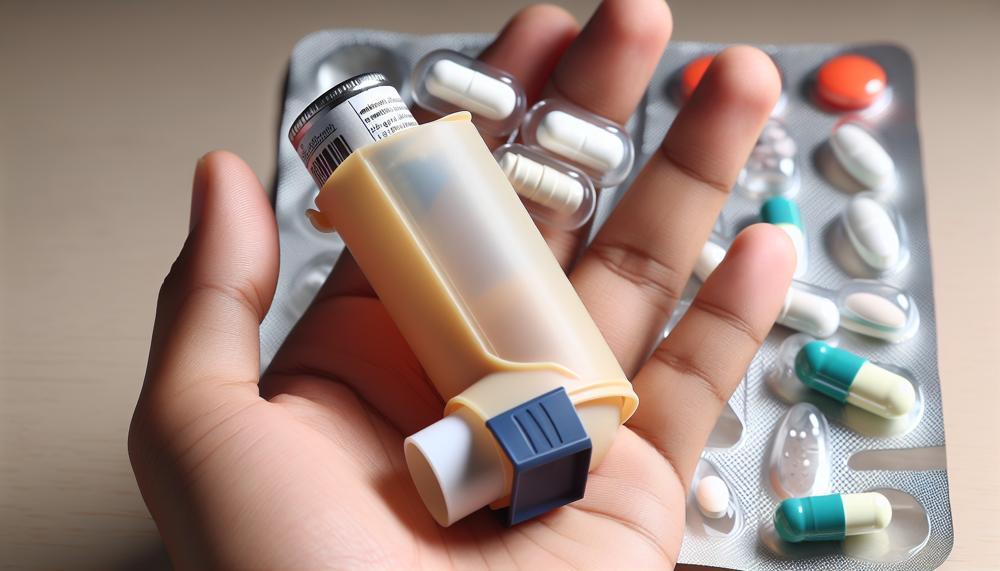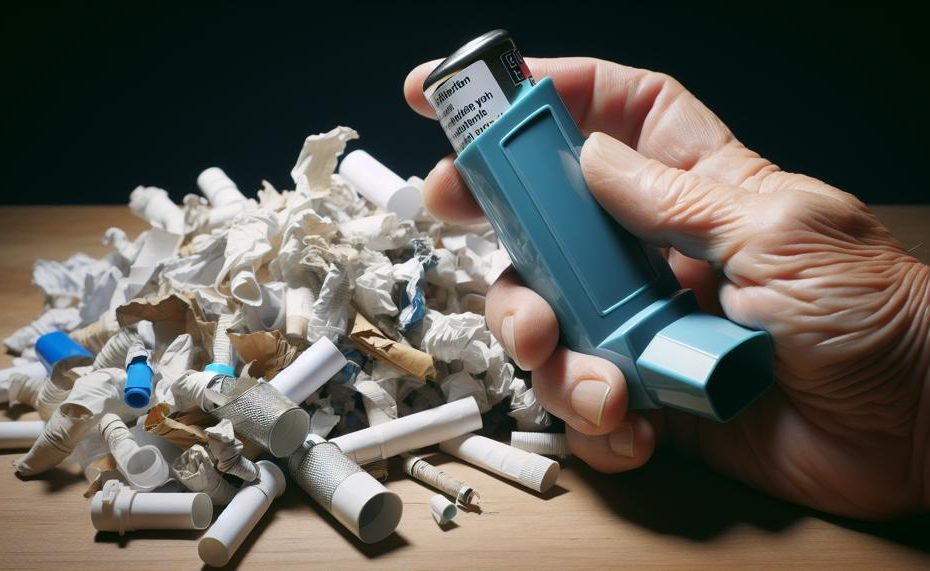Are you one of the millions who rely on inhalers to manage respiratory conditions like asthma? If so, you know how crucial it is to have a functioning inhaler at all times. But what happens when your inhaler runs out or expires?
Many are unsure of how to dispose of them safely, putting themselves and the environment at risk.
In this blog post, we will delve into the importance of proper inhaler disposal and provide you with essential steps to do so in an environmentally-friendly manner.
Here are some key points to remember:
- Inhalers contain pressurized canisters that can be harmful if not disposed of correctly.
- Improper disposal can also harm the environment by releasing harmful chemicals into the air and water.
- It is crucial to follow specific guidelines for disposing of different types of inhalers, such as metered-dose (MDIs) and dry powder (DPIs) inhalers.
- Various options exist for safely disposing of inhalers, including recycling programs and designated drop-off locations.
- By properly disposing of your inhaler, you not only protect yourself and others but also contribute to a healthier planet.
Don’t let improper disposal jeopardize your well-being or damage our planet. Keep reading to discover how you can safely dispose of your inhaler.
Contents
- 1 How To Dispose Of Inhalers Safely?
- 2 Guidelines for Disposing of Inhalers Safely: Tips from Experts
- 3 Utilizing Drop-off Locations and Take-back Programs for Safe Inhaler Disposal
- 4 How to Recycle Inhalers: Step-by-Step Guide for Environmentally-Friendly Disposal
- 5 Alternative Methods for Rendering Inhalers Unusable: Safety Precautions and Instructions
- 6 Specific Disposal Instructions for Emergency Asthma Attack Inhalers
- 7 Common Mistakes to Avoid When Disposing of Inhalers
- 8 Conclusion
How To Dispose Of Inhalers Safely?
Inhalers are an essential tool for managing respiratory conditions, but if not disposed of properly, they can have harmful effects on the environment. It is important to follow safe and proper methods when disposing of inhalers to protect ourselves and our surroundings. Here are some ways you can dispose of inhalers responsibly:
- Look for designated drop-off locations or take-back programs: Many communities have programs that collect unused or expired inhalers and dispose of them according to environmental regulations.
- Contact your local waste management facility: If there are no designated drop-off locations or take-back programs in your area, contact your local waste management facility for specific guidelines on how to properly dispose of medical waste, including inhalers.
- Separate the plastic casing and metal canister before recycling: Before disposing of the inhaler, make sure to remove any remaining medication by using it until it is completely empty. Then, recycle the plastic casing with other plastics and the metal canister with other metals.
- Make sure the inhaler is unusable before throwing it away: In case recycling options are not available, puncture or crush the metal canister to render the inhaler unusable before throwing it away in the regular household trash.
- Follow specific disposal instructions on the label or consult with your healthcare provider: Different types of inhalers may have specific disposal instructions, so be sure to read the label or consult with your healthcare provider for proper disposal methods.
Remember, proper disposal of inhalers is crucial for our health and the environment. By following these guidelines, we can ensure that inhalers do not harm our surroundings and potentially put others at risk. Always check with your local waste management facility for specific guidelines and never dispose of inhalers in the regular household trash without rendering them unusable first.
Guidelines for Disposing of Inhalers Safely: Tips from Experts

It is essential to properly dispose of inhalers to protect both our health and the environment. To ensure safe and responsible disposal, here are some expert tips that you should follow:
- Check with your local waste management facility for any specific guidelines on how to dispose of medical waste in your area. This is important as different areas may have different regulations regarding medical waste disposal.
- Utilize designated drop-off locations or take-back programs for inhaler disposal. This method is not only the safest but also the most environmentally-friendly option.
- Before disposing of your inhaler, make sure to remove any remaining medication and separate the plastic casing from the metal canister. The plastic casing can be recycled, while the metal canister may need to be disposed of separately.
- Render the inhaler unusable before throwing it away. This can be done by puncturing or crushing the metal canister, but be cautious when handling it.
- Always read the label or consult with your healthcare provider for specific disposal instructions. Some inhalers may require different disposal methods, so it is crucial to check before disposing of them.
Proper inhaler disposal is crucial, and by following these expert tips, you can ensure that you are doing your part in protecting our health and the environment.
Utilizing Drop-off Locations and Take-back Programs for Safe Inhaler Disposal
When it comes to safely disposing of inhalers, there are multiple options available, such as utilizing designated drop-off locations and take-back programs. These methods not only ensure responsible disposal but also help protect the environment.
- Return them to a pharmacy: Many pharmacies offer take-back programs for expired or unused medications, including inhalers. This is the easiest and most environmentally-friendly disposal option, as pharmacies have proper systems in place for disposing of inhalers.
- Throw them in the garbage: If there are no designated drop-off locations or take-back programs available, you can dispose of your inhaler in the garbage. However, it is important to take precautions by sealing the inhaler in a container (such as a re-sealable zipper storage bag or empty can) to prevent any drug residue from leaking or spilling out.
- Scratch out personal information: Before disposing of your inhaler, make sure to scratch out all personal information on the packaging to protect your identity and privacy.
- Check expiration date: If your inhaler has expired, it should be thrown away. Do not use an expired inhaler as it may not effectively treat your condition.
- Separate plastic casing from metal canister: For metered-dose inhalers (MDIs), be sure to remove the canister from the plastic actuator before disposal. The plastic casing can be recycled separately from the metal canister.
- Render it unusable: To prevent anyone from accidentally using your disposed inhaler, it is recommended to puncture the canister before throwing it away.
It is crucial to follow specific instructions for disposing of different types of inhalers. For instance, some dry powder inhalers may require being returned to the manufacturer for proper disposal. Additionally, check local guidelines as some areas may have specific regulations for disposing of medical waste.
| Method | Description |
| Return to pharmacy | Pharmacies offer take-back programs for expired or unused inhalers, ensuring safe and environmentally responsible disposal. |
| Throw in the garbage | If no designated drop-off location is available, dispose of inhalers in a sealed container to prevent drug residue from leaking or spilling out. |
| Scratch out personal information | Before disposal, scratch out personal information on the packaging to protect identity and privacy. |
| Check expiration date | If inhaler has expired, throw it away as it may not be effective in treating conditions. |
| Separate plastic casing from metal canister | For MDIs, remove canister from plastic actuator before disposal. Plastic casing can be recycled separately from metal canister. |
How to Recycle Inhalers: Step-by-Step Guide for Environmentally-Friendly Disposal
If you want to safely dispose of your inhalers in an environmentally-friendly manner, there are several steps you can follow.
These include conducting proper research, adhering to safety guidelines, and utilizing designated drop-off locations or take-back programs.
Step 1: Check with Your Local Waste Management Facility
To ensure proper disposal of your inhalers, the first step is to check with your local waste management facility for specific guidelines.
Some areas may have regulations for disposing of medical waste, including inhalers. It is crucial to follow these guidelines to reduce harm to the environment.
Step 2: Utilize Designated Drop-off Locations or Take-Back Programs
One option for safe inhaler disposal is through designated drop-off locations or take-back programs. These programs are often available at pharmacies, hospitals, or other medical facilities.
They collect unused or expired medications, including inhalers, and dispose of them properly according to environmental regulations.
Step 3: Remove Medication and Separate Components
Before disposing of an inhaler, remove any remaining medication from the canister by fully using it until it is empty.
Then, detach the plastic casing from the metal canister and separate them. The plastic casing can be recycled with other plastics, while the metal canister can be recycled with other metals.
Step 4: Render Inhaler Unusable
If recycling options are not available, the next step is to render the inhaler unusable before throwing it away.
This can be done by puncturing the metal canister or crushing it. However, caution should be taken when handling the metal canister to avoid any potential injury.
Step 5: Dispose of Inhaler in Trash
Once the inhaler is rendered unusable, it can be safely disposed of in the regular household trash. However, it is important to note that not all inhalers can be disposed of in the same way. Some may have specific instructions due to different types of medication.
By following these steps, individuals can properly dispose of their inhalers in an environmentally-friendly manner. Remember to always check with local regulations and guidelines, as well as consult with healthcare providers for specific instructions.
By disposing of inhalers correctly, we can protect our health and the environment.
Alternative Methods for Rendering Inhalers Unusable: Safety Precautions and Instructions
There are many ways to properly dispose of inhalers, including returning them to a pharmacy, participating in a recycling program, or using safe DIY methods.
These methods are important for safeguarding our health and the environment, as they prevent harmful chemicals and gases from polluting the air, soil, and water supply. Here are detailed instructions and precautions for each method:
| Method | Instructions | Precautions |
| Return to a pharmacy or medical facility | – Check with your pharmacy if they offer a take-back program for inhalers – If available, return your unused or expired inhaler to the designated drop-off location – Follow any specific instructions provided by the pharmacy – Inquire about any discounts or incentives for returning inhalers |
– Remember to remove any medication from the inhaler before returning it – Do not puncture or attempt to open the inhaler – Adhere to proper handling and transportation guidelines to prevent accidents or leaks |
| Participate in a recycling program | – Check if there are any specialized inhaler recycling programs in your area – If available, follow their instructions for proper disposal of inhalers – Some programs may require you to disassemble the inhaler before recycling it – Ask about any incentives or rewards offered by the program |
– Make sure to remove any medication from the inhaler before recycling it – Follow proper handling and transportation guidelines to prevent accidents or leaks – Confirm if the program accepts all types of inhalers before participating – Some programs may only accept specific types or brands of inhalers |
| Use safe DIY methods at home | – Puncture the pressurized canister of the inhaler with a nail or screwdriver – Recycle the empty canister separately from the plastic casing – Alternatively, remove the plastic casing and recycle it separately from the canister |
– Consult with a healthcare provider or pharmacist before attempting any DIY methods – Follow proper safety guidelines when puncturing the canister – Only use DIY methods if you are unable to return the inhaler to a pharmacy or participate in a recycling program |
By following these alternative methods, individuals can ensure the safe disposal of their inhalers and contribute to protecting the environment. Always remember to remove any medication, separate components, and render the inhaler unusable before disposing of it.
Specific Disposal Instructions for Emergency Asthma Attack Inhalers
There are multiple measures you can take to safely dispose of emergency asthma attack inhalers. These steps include comprehending the components of the inhaler, avoiding puncturing or incinerating them, and utilizing appropriate disposal methods such as household trash, recycling programs, or mail-back programs.
By adhering to these instructions, we can prevent environmental contamination and safeguard our health and the environment.
See the table below for a summary of secure disposal methods for emergency asthma attack inhalers.
| Step | Instructions |
| 1 | Understand the elements of the inhaler (metal canister, plastic mouthpiece, propellant). |
| 2 | Never pierce or ignite an inhaler. |
| 3 | Completely exhaust the canister by using all the medication before disposal. |
| 4 | Dispose of empty or expired inhalers in household waste. |
| 5 | Take part in recycling programs for proper disposal. |
| 6 | Utilize mail-back programs provided by manufacturers for secure and environmentally-friendly disposal. |
By following these instructions and utilizing these safe disposal methods, we can all do our part in protecting the environment and preventing harm to others. Remember to always dispose of emergency asthma attack inhalers properly and never contribute to pollution or harm.
Keep in mind that these simple steps can have a significant impact on our planet and our health. So, let’s make sure we are taking responsibility for our actions and making informed decisions when it comes to disposing of emergency asthma attack inhalers.
Common Mistakes to Avoid When Disposing of Inhalers
When it comes to disposing of inhalers, there are several common mistakes that people make. These mistakes can have harmful consequences for our health as well as the environment. By understanding these mistakes and how to avoid them, we can ensure safe disposal of inhalers while also protecting our resources.
| Common Mistakes | How to Avoid |
| Improperly disposing of expired inhalers in the trash or flushing them down the toilet | To prevent contamination of soil and water, return outdated medications to a pharmacist for safe disposal. Alternatively, carefully rinse and dry inhalers before wrapping them in a plastic bag and disposing of them in the trash. |
| Disregarding the need to rinse and dry old inhalers before disposal | Rinse and dry inhalers before wrapping them in a plastic bag to avoid potential explosions due to gas build-up. |
| Attempting to recycle inhalers at home | Inhalers cannot be recycled at home due to their hazardous ingredients. Instead, check with local police stations or fire departments for medical waste disposal bins. |
| Not following the instructions on the medicine label for proper disposal methods | To avoid potential health and environmental hazards, always read and follow the instructions on the medicine label for proper disposal methods. |
Conclusion
In summary, the correct disposal of inhalers is crucial for our well-being and the health of our planet.
These devices contain pressurized canisters that can be hazardous if not disposed of properly, and improper disposal can also harm the environment by releasing harmful chemicals into the air and water. It is vital to adhere to specific guidelines when disposing of different types of inhalers, such as metered-dose (MDIs) and dry powder (DPIs) inhalers.
Fortunately, there are various options available for safely disposing of inhalers, including recycling programs and designated drop-off locations. By taking the necessary steps to dispose of your inhaler correctly, you not only protect yourself and others but also contribute to a healthier planet.
To ensure safe and responsible disposal, it is important to consult with your local waste management facility for specific guidelines. Utilizing designated drop-off locations or take-back programs is another option for proper disposal.
Before recycling your inhaler, make sure to remove any remaining medication and separate its components. Additionally, rendering the device unusable before throwing it away in the trash is essential.
By following these steps diligently, we can all play a role in safeguarding our health and preserving our environment.





